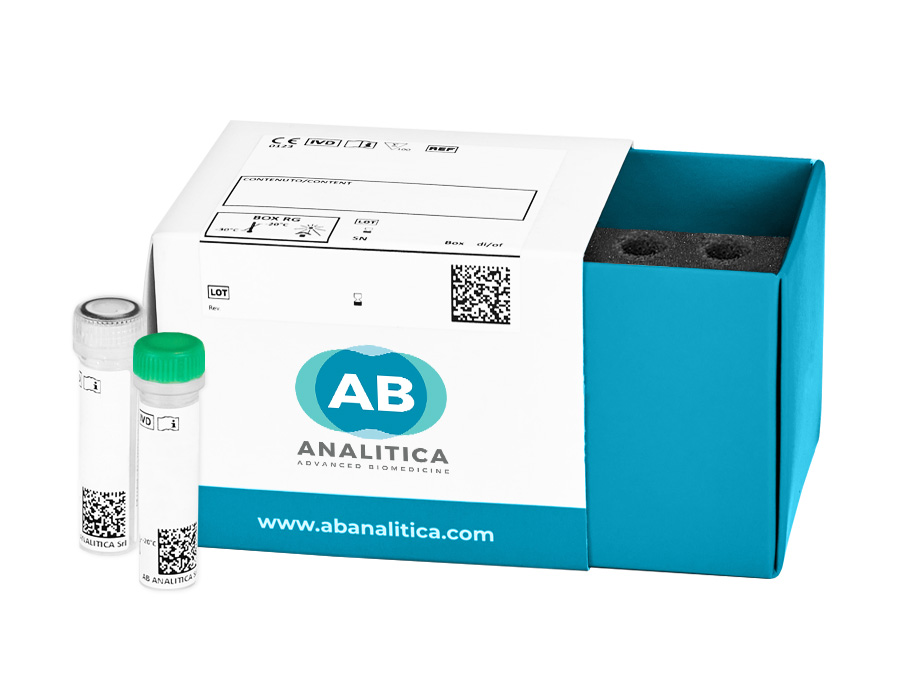Description
The REALQUALITY RS-MTHFR A1298C is an IVD for detection and genotyping of the A1298C mutation in the human gene coding for Methylentetrahydrofolate Reductase by Real-Time PCR.
Product Characteristics
- The assay requires only 1 µL of DNA extracted
- Validated on main Real time PCR instruments
- The assay includes dUTP/UNG system for preventing carry-over contamination and a fluorescence normalizer
- The automatic format of the assay can be used on GENEQUALITY® automatic platforms
- It includes an automatic interpretation of results with AB SNP Report software
Kit content
Kit content:
- Ready-to-use reagents for Real-time PCR amplification
- Homozygous (I/I and D/D) and heterozygous (I/D) positive controls
Further Information
Thrombophilia is commonly defined as any acquired or hereditary disorder associated with an increased risk to develop thromboembolic phenomena. These phenomena occur when blood circulation is blocked by clots, originating in veins or derived from a thrombus in another area of the body. Most commonly, thrombi develop in superficial or deep veins of the legs, but can also be found in veins of the brain, retina, liver or in mesenteric veins.
Hereditary thrombosis is associated with an onset at earlier age, due to the presence of one or more genetic defects caused by gene-to-gene and/or gene-to-environment interactions.
Genetic alterations of different blood components may directly or indirectly influence blood homeostasis, thus triggering a prothrombotic state. Such alterations may lead to the loss of function of natural anticoagulants
(e.g. Protein C, Protein S, Antithrombin), to an increased activity of procoagulant factors (e.g. Prothrombin, Factor V, Factor VII, Factor IX, Factor XIII, MTHFR, MTRR) or to diminished fibrinolytic activity (e.g. PAI-1, TAFI).
The N5, N10-methylenetetrahydrofolate reductase (MTHFR) catalyses the reduction of N5, N10 -methylenetetrahydrofolate to N5-methyltetrahydrofolate, which, using vitamin B12 as cofactor, acts as a methyl group donor for the remethylation of homocysteine to methionine.
A genetic polymorphism commonly associated with severe MTHFR deficiency is defined by a C to T substitution (cytosine – thymine) at position 677 of the MTHFR gene (C677T). This substitution leads to the incorporation of the amino acid alanine (A) instead of valine (V) at position 222 of the MTHFR protein. The activity of the altered enzyme is reduced by 50 % compared to the wild-type MTHFR and further decreased to only 30 % of normal, if the protein is exposed to heat. This thermolabile MTHFR variant is associated with high plasma homocysteine levels, particularly after oral intake of methionine. MTHFR A1298C is another genetic variation of the MTHFR gene that is associated with a reduced enzyme activity. The MTHFR 1298C allele produces a protein that exhibits 60 % of the normal enzyme activity, whereas MTHFR 1298C and MTHFR 677T together reduce enzyme activity to 40 % of normal. In patients carrying the 677T variant, 1298C has been shown to lead to an increase in blood homocysteine levels. Today, elevated homocysteine levels are considered a risk factor for vascular diseases (arterial thrombosis).
Ordering Information
| Code | Product | PKG |
|---|---|---|
| RQ-31-4M | REALQUALITY RS-MTHFR A1298C | 50 tests |
| RQ-31-6M | REALQUALITY RS-MTHFR A1298C | 100 tests |
| RQ-31-4A | REALQUALITY RS-MTHFR A1298C - Automatic format | 50 tests |
| RQ-31-6A | REALQUALITY RS-MTHFR A1298C - Automatic format | 100 tests |









